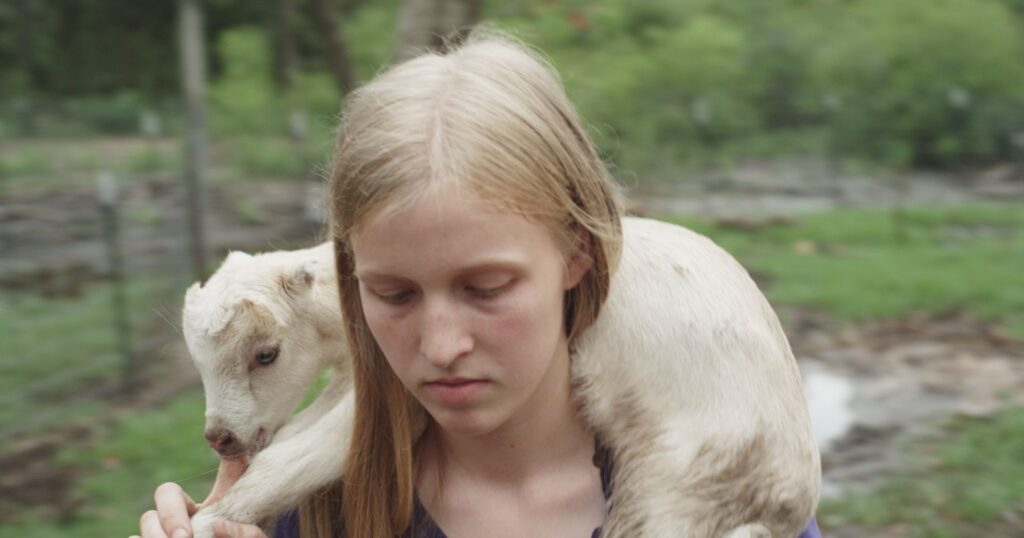The handheld, behind-the-head following shot loosely trailing a character in movement is often a staple of nonjudgmental, naturalistic filmmaking, coming as it does with a built-in implication of directorial humility. It’s an approach that relinquishes autonomy to the body being photographed rather than the personality behind the camera. That the audience is so often oriented without visual access to the subject’s face only further ensures the character’s independence. We might even say this artistic angle is a form of submission, an attempt on the filmmaker’s part to render the camera a passively observational observer — all while hopefully belying empathetic strength. Roberto Minervini’s Stop the Pounding Heart is rife with such shots, and it’s fitting that the film’s moral universe is also couched in paradoxical notions of submission and autonomy. Set in the soggy woodlands outside of Houston, Texas, it trades time between a fundamentalist Christian family of goat farmers and a more casually faithful community of bull-riders nearby. LeeAnne Carlson instructs Sara, one of her twelve children, on the hypothetical significance of subservience to the male race even while folding this Bible-taught wisdom into a larger lesson about self-actualization. Meanwhile, boys receive macho pep talks from their elders while aiming to master the art of bull-riding, a sport based upon surrendering control to an unpredictable animal. The film’s title perfectly captures the peculiar double standards ruling the path to maturity in these environments: Navigating certain pre-ordained sets of expectations seems almost a biological impossibility.
Revealing character epiphanies flow organically into Minervini’s democratic mise-en-scène.
Plunging into the heart of her awkward years while steadily accumulating responsibility in her family’s artisanal goat-cheese enterprise, Sara is taking the pressures of this predicament especially hard. To the extent that this discreet rural chamber drama has a plot to speak of, it concerns Sara’s latent but growing attraction to Colby Trichell, a steer-bouncing natural with a tentatively sprouting mustache and an amiable drawl. But the film’s real outline is traced along the deceptive contours of Sara’s psyche as she slowly registers a bigger reality beyond her hermetically sealed, home-schooled existence. With more afternoon strolls over to Colby’s muddy ring (regularly resulting in only meandering small talk) come more hints of Sara’s estrangement from her family’s patterns of thought and action; she shyly deflects attention while her female siblings optimistically deliberate on desired future marriages, gets scolded by her father for inadequate fence installation, and ultimately concedes to her mother her anxiety about fulfilling the traits of a “good Christian.” These revealing character epiphanies flow organically into Minervini’s democratic mise-en-scène, registering less as primary motivators of the film’s narrative than as anthropological discoveries within a documentary record of life in off-the-grid Texas. Like a significant portion of low-budget, serious-minded independent work taking place today, Stop the Pounding Heart falls squarely in the trend of on-location, non-actor-employing, process-oriented hybrid filmmaking. Thankfully, though, it bares no disingenuous traces of bandwagon-hopping. Himself born into an Italian working-class family, Minervini has palpable affection for his subjects and refuses to place them under an unflattering editorial light. “For me, to be an observer, that implies letting go of control and giving creative power to the other people involved,” he stressed in a recent Filmmaker magazine profile, hinting at a sense of diplomacy that plays out in the film’s relaxed longueurs and patient build-up toward narrative revelations — the most arresting of which is a lengthy climactic mother-daughter bonding moment that exudes warmth even as it leaves unsettling ideological loose ends. Minervini, whose name we’ll hopefully see more of, has fashioned a film rich in psychological mystery and ethnographic texture.

